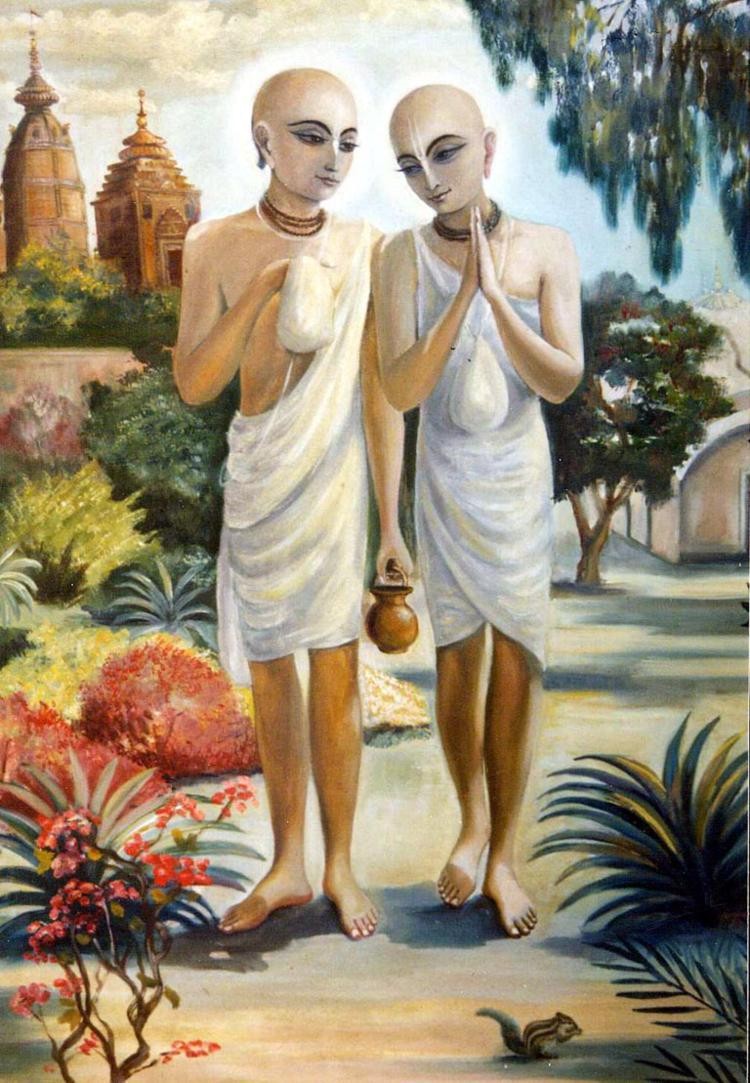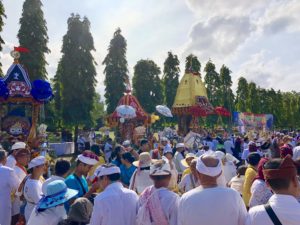 Today is Guru-purnima. Srila Prabhupada has explained that the system of honoring the spiritual master annually is current among all Vedic followers. In Mayavadi (impersonalist) sects, disciples offer respect to the spiritual master on Guru-purnima. And in the Gaudiya Vaishnava sampradaya, disciples offer homage on the appearance day of the spiritual master, in a ceremony called Vyasa-puja because the spiritual master, through disciplic succession, presents the same knowledge as Vedavyasa, the empowered incarnation of Krishna who compiled the Vedic literatures. We shall take this opportunity to discuss the principle of guru—and glorify the acarya-sampradaya.
Today is Guru-purnima. Srila Prabhupada has explained that the system of honoring the spiritual master annually is current among all Vedic followers. In Mayavadi (impersonalist) sects, disciples offer respect to the spiritual master on Guru-purnima. And in the Gaudiya Vaishnava sampradaya, disciples offer homage on the appearance day of the spiritual master, in a ceremony called Vyasa-puja because the spiritual master, through disciplic succession, presents the same knowledge as Vedavyasa, the empowered incarnation of Krishna who compiled the Vedic literatures. We shall take this opportunity to discuss the principle of guru—and glorify the acarya-sampradaya.
Guru is a deep subject. We sing, vande ’ham sri-guroh sri-yuta-pada-kamalam sri-gurun vaisnavams ca, offering respects to the individual spiritual master, to the predecessor acharyas, and to all Vaishnavas.
As Srila Prabhupada explains, “The offering of respect to the spiritual master means offering respect to all the previous acharyas. Gurun means plural number. All the acharyas, they are not different from one another, because they are coming in the disciplic succession from the original spiritual master and they have no different views.” Thus we offer respects to the predecessors.
Similarly, we offer respects to the followers. Srila Prabhupada explains further, “Spiritual master means they must have many followers, who are all Vaishnavas. They are called prabhus, and the spiritual master is called Prabhupada, because at his lotus feet there are many prabhus. Pada means ‘lotus foot.’ All these Vaishnavas are prabhus. So they are also offered respectful obeisances—not the spiritual master alone, but along with his associates. And these associates, his disciples, are all Vaishnavas. Therefore they should also be offered respectful obeisances.” (SP comment on Mangalacarana, January 8, 1969)
For those of us in ISKCON, Srila Prabhupada is the main guru; he is the founder-acharya. But he also has his associates—Srila Gour Govinda Swami, Srila Tamal Krishna Goswami, Srila Sridhar Swami, Srila Bhakti Tirtha Swami, Srila Bhaktisvarupa Damodara Swami—to name some prominent ones who have departed. And of course, Prabhupada is being served by so many others today, and we can serve and learn from them all.
“One who teaches can be treated as spiritual master. . . . So if we take instruction from them, all senior godbrothers may be treated as guru. There is no harm. Actually, you have only one spiritual master, who initiates you, just as you have only one father. But every Vaishnava should be treated as prabhu, master, higher than me, and in this sense, if I learn from him, he may be regarded as guru.” (SP letter dated November 20, 1971)
The original guru is Krishna. He speaks the knowledge of the Bhagavad-gita and enunciates the principles of religion. Dharmam tu saksad bhagavat-pranitam: the principles of dharma—bhagavata-dharma, prema-dharma—are enacted by the Supreme Personality of Godhead. Dharma means “the laws of God,” or “the orders of God.” We cannot manufacture it; dharmam tu saksad bhagavat-pranitam: the principles of religion are enacted by the Lord Himself. We cannot make religious principles any more than we can make our own laws. Srila Prabhupada gave the example that you can’t just get together with some friends and pass your own laws; laws must be enacted by the government, by the parliament or legislature. Similarly, dharma is enacted by God.
dharmam tu saksad bhagavat-pranitam
na vai vidur rsayo napi devah
na siddha-mukhya asura manusyah
kuto nu vidyadhara-caranadayah
“Real religious principles are enacted by the Supreme Personality of Godhead. Although fully situated in the mode of goodness, even the great rsis who occupy the topmost planets cannot ascertain the real religious principles, nor can the demigods or the leaders of Siddhaloka, to say nothing of the asuras, ordinary human beings, Vidyadharas, and Caranas.” (SB 6.3.19)
The conclusion of the Bhagavad-gita is sarva-dharman parityajya mam ekam saranam vraja—to give up all varieties of dharmas and just surrender to Krishna. And to understand the confidential truths about religious principles and the knowledge of the Bhagavad-gita, we need the help of mahajanas, authorities in Krishna consciousness—gurus.
svayambhur naradah sambhuh
kumarah kapilo manuh
prahlado janako bhismo
balir vaiyasakir vayam
dvadasaite vijanimo
dharmam bhagavatam bhatah
guhyam visuddham durbodham
yam jnatvamrtam asnute
“Lord Brahma, Bhagavan Narada, Lord Siva, the four Kumaras, Lord Kapila [the son of Devahuti], Svayambhuva Manu, Prahlada Maharaja, Janaka Maharaja, Grandfather Bhisma, Bali Maharaja, Sukadeva Gosvami, and I myself [Yamaraja] know the real religious principle. My dear servants, this transcendental religious principle, which is known as bhagavata-dharma, or surrender unto the Supreme Lord and love for Him, is uncontaminated by the material modes of nature. It is very confidential and difficult for ordinary human beings to understand, but if by chance one fortunately understands it, he is immediately liberated, and thus he returns home, back to Godhead.” (SB 6.3.20–21)
This confidential knowledge is given by God in scriptures and passed down through disciplic succession (evam parampara-praptam) to great souls who in turn impart the knowledge to their eager followers. And of all scriptures, Srimad-Bhagavatam is considered the most important, the ripened fruit of the tree of Vedic knowledge.
nigama-kalpa-taror galitam phalam
suka-mukhad amrta-drava-samyutam
pibata bhagavatam rasam alayam
muhur aho rasika bhuvi bhavukah
“O expert and thoughtful men, relish Srimad-Bhagavatam, the mature fruit of the desire tree of Vedic literatures. It emanated from the lips of Sri Sukadeva Gosvami. Therefore this fruit has become even more tasteful, although its nectarean juice was already relishable for all, including liberated souls.” (SB 1.1.3)
This nectarean fruit is passed down to us through disciplic succession. In commenting on this verse, Srila Visvanatha Cakravarti Thakura gives the example of a mango tree. To get a ripe mango from the top of a tree, several boys climb onto its branches and then the boy at the top plucks the fruit and hands it to the boy on the next branch down, that boy hands it down to the one on the next branch, and so on, until finally it reaches the boy on the ground—in the same condition as it was at the top of the tree. It hasn’t been bruised or broken; it has been delivered intact, just as it was.
At the top of our tree is Krishna, and He passes the knowledge down to Brahma. Brahma passes it to Narada, and Narada passes it to Vyasa. (Today is also called Vyasa-purnima because Vyasadeva, who compiled the Vedic literature, appeared on this date.) Vyasa passes it to Madhvacharya, and so on—Chaitanya Mahaprabhu, the Six Gosvamis, and, further down, Srila Bhaktivinoda Thakura, Srila Gaurakisora dasa Babaji Maharaja, Srila Bhaktisiddhanta Sarasvati Thakura, and Srila Prabhupada. And now the followers of Srila Prabhupada are presenting the same knowledge. They follow and present the same teachings—that is their qualification.
About Vedavyasa, Prabhupada wrote, “Vyasadeva was a real person accepted by all authorities, and anyone can judge how wonderful he was to have compiled the Vedic literatures. He is therefore known as Mahamuni. Muni means ‘thoughtful’ or ‘great thinker’ or ‘great poet,’ and maha means still greater. There is no comparison of Vyasadeva with any other writer or thinker or philosopher. Nobody can estimate the scholarly importance of Srila Vyasadeva. He composed many millions of Sanskrit verses, and we try to receive just a fragment of the knowledge in them by our tiny efforts. Srila Vyasadeva therefore summarized the whole Vedic knowledge in Srimad-Bhagavatam, which is known as the ripened fruit of the desire tree of Vedic knowledge. The ripened fruit is received hand to hand through disciplic succession, and anyone who does this work in disciplic succession from Srila Vyasadeva is considered a representative of Vyasadeva, and as such the bona fide spiritual master’s appearance day is worshiped as Vyasa-puja.” (Srila Prabhupada letter dated August 25, 1970)
In addition to being Vyasa-purnima, the appearance day of Vedavyasa, today is also the disappearance day of Srila Sanatana Gosvami, the seniormost of the Six Gosvamis of Vrindavan. His book Brhad-Bhagavatamrta was the Gosvamis’ first major work. Sanatana Gosvami also comes in the disciplic succession from Lord Krishna to Brahma, but he is especially significant because he is a direct follower of Sri Chaitanya Mahaprabhu, who is Krishna Himself. Because Lord Chaitanya is Krishna, He is capable of beginning His own disciplic succession, but because He was acting as a devotee, He chose to take initiation in the disciplic succession from Krishna and Brahma. Still, He is God, and the process by which He imparted knowledge to His immediate followers—Rupa Gosvami and Sanatana Gosvami—is comparable to the way Lord Krishna imparted knowledge to Brahma. Srila Krsnadasa Kaviraja Gosvami, in his Caitanya-caritamrta, writes of Sanatana’s younger brother Rupa:
vrndavaniyam rasa-keli-vartam
kalena luptam nija-saktim utkah
sancarya rupe vyatanot punah sa
prabhur vidhau prag iva loka-srstim
“Before the creation of this cosmic manifestation, the Lord enlightened the heart of Lord Brahma with the details of the creation and manifested the Vedic knowledge. In exactly the same way, the Lord, being anxious to revive the Vrndavana pastimes of Lord Krsna, impregnated the heart of Rupa Gosvami with spiritual potency. By this potency, Srila Rupa Gosvami could revive the activities of Krsna in Vrndavana, activities almost lost to memory. In this way, He spread Krsna consciousness throughout the world.” (Cc Madhya 19.1) Lord Chaitanya also empowered him to write books on bhakti-yoga, and the same could be said about Sanatana Gosvami.
We are followers of the Six Gosvamis—followers of their followers. Srila Narottama dasa Thakura prays,
ei chaya gosai yara-mui tara dasa
tan’-sabara pada-renu mora panca-grasa
“I am the servant of that person who is a servant of the Six Gosvamis. The dust of their holy feet is my five kinds of foodstuffs.”
And:
tandera carana sevi-bhakta-sane vasa
janame janame hoy ei abhilasa
“This is my desire, that birth after birth I may live with those devotees who serve the lotus feet of the Six Gosvamis.”
A few weeks ago, we were fortunate to receive four visitors from Dallas, disciples of Tamal Krishna Goswami—Dharma dasa and his wife Urjesvari, her sister Saibya, and Padma dasi. At the same time, Mayapur dasa, Sridhar Swami’s personal servant for many years, was also with us. So we thought it was a good occasion to glorify these two stalwart servants of Srila Prabhupada, these two powerful preachers, Tamal Krishna Goswami and Sridhar Swami. And it was very enlivening and purifying. All of the devotees spoke beautifully—each and every one—and we could really feel Tamal Krishna Goswami’s and Sridhar Swami’s presence and really feel united with Srila Prabhupada and his associates. His Holiness Niranjana Swami also spoke very beautifully and led kirtan.
Although all of Srila Prabhupada’s direct disciples are godbrothers and godsisters in that we were all initiated by His Divine Grace, still, among his followers there are some who were—and are—really leading the movement and showing the way for others to follow. Certainly His Holiness Tamal Krishna Goswami was a great pioneer, as were His Holiness Sridhar Swami and the others I mentioned. And even now devotees are following Srila Prabhupada and leading us and showing us the way. We also are trying to make our little contributions, but still, there are some who are ahead of us, showing the way and making it easier for us to follow.
At the same time, it is also very personal and individual—through whom Krishna speaks to whom. And it is not that everyone has to follow only one particular person. Krishna can manifest Himself—and Prabhupada can manifest himself—through different servants, different Vaishnavas, and we should be open to that flow of mercy however and through whomever it comes. It is not fixed or rigid; it can come in different ways, and we should be open to it. That is really the principle of guru: Krishna’s instructions come to us through some servant of Krishna, some representative of Krishna—and it is not limited to only one; Krishna can speak to us through many mouths, through many personalities, and we should be open to that guidance. We should take His instructions on our head and follow them. That is how Krishna guides the conditioned souls back home, back to Godhead. He can engage any number of His servants to help us; God knows we need all the help we can get. So we shouldn’t be sectarian. We shouldn’t cut ourselves off from any flow of mercy that may come to us by the arrangement of the Lord, or of Srila Prabhupada, or of any of our spiritual masters.
I think of the example of Raghunatha dasa Gosvami, because he had so many gurus. Of course, he was a direct associate of Lord Chaitanya Himself, but even then, he was helped by so many well-wishers and guides. First, he was initiated by Yadunandana Acharya, Raghunatha’s family’s spiritual master. Yadunandana Acharya himself was a great Vaishnava, an initiated disciple of Advaita Acharya and an intimate student of Vasudeva Datta. And Balarama Acharya, a dear associate of Haridasa Thakura, was Raghunatha’s family’s priest, and Raghunatha learned from him too. Both Balarama Acharya and Yadunandana Acharya, who were friends, hosted Haridasa Thakura at their homes, and for some time, Balarama Acharya provided him with a thatched hut and prasada. Raghunatha, still a student, visited Haridasa daily, and it is said that because of the mercy Haridasa showed him then, Raghunatha later attained the mercy of Sri Chaitanya Mahaprabhu. Once, Balarama Acharya invited Haridasa to speak in the assembly of Raghunatha’s family, the Majumadaras, and thus Raghunatha heard from him again, about the glories of the holy name.
Eventually, Raghunatha dasa met Nityananda Prabhu at Panihati and got His benediction to become free from all obstacles and attain shelter at the lotus feet of Sri Chaitanya Mahaprabhu. Soon, he escaped from home, traveled by foot to Puri, and attained the merciful shelter of Mahaprabhu—by the mercy of Nityananda. Then Mahaprabhu entrusted Raghunatha dasa to Svarupa Damodara Gosvami: “I entrust Raghunatha to you. Please accept him as your son or servant.”
Raghunatha was still very young, only about twenty-two. The Lord took Raghunatha’s hand and personally placed him in the hands of Svarupa Damodara Gosvami. And so Raghunatha became Svarupa Damodara’s assistant. Svarupa Damodara was Sri Chaitanya Mahaprabhu’s secretary, and Raghunatha dasa in effect became assistant secretary.
After Chaitanya Mahaprabhu left this world, followed by Svarupa Damodara and almost all of His other intimate associates, Raghunatha dasa felt bereft: “I am all alone. There is no reason to live. How can I live without my prabhus, without all of my masters?”
Raghunatha felt so much separation that he decided to go to Vrindavan to see the lotus feet of Rupa and Sanatana and then give up his life by jumping from Govardhana Hill. But the two brothers would not allow him to die. They prevailed upon him to stay with them and speak about Mahaprabhu’s later pastimes. “You should not give up your life,” they told him. “You were with Sri Chaitanya Mahaprabhu in Puri and were witness to so many of His intimate pastimes. You should stay with us and tell us about your experiences with Him.” And they accepted him as their third brother.
Especially Sanatana Gosvami gave him shelter and took care of him. At first, when Raghunatha dasa was doing bhajana at Radha-kunda, he didn’t have any residence. And while doing his bhajana, he was pretty much oblivious to everything else. He would chant, but he could hardly chant sometimes, because he would go into trance. Still, he chanted at least one lakh names every day. But it could happen that he would chant one name and then go into deep trance, and the pastimes of Krishna would play in his mind. Like that, he was chanting Krishna’s name and remembering Krishna’s pastimes one day, and the hot sun was beating down on his head, and Srimati Radharani Herself came and held a cloth over his head, but he didn’t know it, because he was in deep meditation. But Sanatana Gosvami understood, and he personally built a bhajana-kutira for Raghunatha dasa Gosvami. He took care of Raghunatha dasa in every respect.
In his book Vilapa-kusumanjali, Raghunatha dasa Gosvami begins by offering respects to his gurus, including Sanatana Gosvami:
vairagya-yug-bhakti-rasam prayatnair
apayayan mam anabhipsum andham
krpambudhir yah para-duhkha-duhkhi
sanatanas tam prabhum asrayami
“I was unwilling to drink the nectar of devotional service possessed of renunciation, but Sanatana Gosvami, out of his causeless mercy, made me drink it, even though I was otherwise unable to do so. Therefore he is an ocean of mercy. He is very compassionate to fallen souls like me, and thus it is my duty to offer my respectful obeisances unto his lotus feet.” (Vilapa-kusumanjali 6)
In this verse Raghunatha dasa Gosvami describes Sanatana Gosvami with a phrase that Srila Prabhupada often quoted (for all compassionate Vaishnavas): para-duhkha-duhkhi—“he felt sorrow in the sorrow of others.” Raghunatha dasa says, vairagya-yug-bhakti-rasam prayatnair—he gave me the nectar of devotional service enriched with renunciation; anabhipsum andham—but I was unwilling (anabhipsum) to drink it, because I was blind (andham) to my spiritual well-being; so apayayan mam—he forced me to drink it. Sanatana Gosvami is an ocean of mercy (krpambudhi), and therefore I offer my respectful obeisances to him. I take shelter of him, my master (prabhum asrayami).
Srila Prabhupada paraphrased this verse in composing a verse to honor his sannyasa-guru, Srila Bhaktiprajnana Kesava Gosvami Maharaja. He used almost the same words. The idea is that it is very hard to become free from the shackles of family life. Of course, one can be a pure devotee in the grihastha-ashrama—that is another thing—but to preach, sannyasa may be advised.
As Srila Prabhupada describes it, he was having recurring dreams that his guru maharaja was calling him to follow him and preach. And he would wake up horrified: “How can I take sannyasa and become a mendicant? How can I leave my wife and children? What would happen?” Eventually Prabhupada accepted vanaprastha. He went to Jhansi and began the League of Devotees. But there was some politics. The wife of the governor wanted the property that Prabhupada had been using for the League. She made all efforts to get it for some ladies’ program, and because she was so influential, Prabhupada decided not to fight against her; he left and went to Mathura, where he stayed in the matha of his godbrother Bhaktiprajnana Kesava Gosvami Maharaja. There, Kesava Maharaja insisted, “You must take sannyasa.” To fully take up the order of the spiritual master and preach, one must accept the renounced order of life. And so Prabhupada did—he took sannyasa.
In 1968—in the early days of the Krishna consciousness movement in the West—in Seattle, Srila Prabhupada got news that His Holiness Kesava Maharaja had passed away. He held a meeting with his disciples there and spoke about the history, how his guru maharaja and his godbrother had “forced” him to take sannyasa: “My godbrother insisted. Not that he insisted—practically my spiritual master insisted through him, that ‘You accept.’ He wanted me to become a preacher, so he forced me through this godbrother: ‘You accept.’ So, unwillingly I accepted.”
Srila Prabhupada saw that his guru maharaja had been working through his godbrother, speaking through his godbrother—another Vaishnava—and he composed this verse, very similar to the one Raghunatha dasa composed for Sanatana Gosvami—but for Kesava Maharaja. Apayayan mam anabhipsum andham. “I was unwilling to take the medicine of bhakti with detachment because I was blind. I could not see my future, that spiritual life is the brightest future. So, the Vaishnavas, the spiritual master, they force: ‘You must drink.’” Sri-kesava-bhakti-prajnana-nama krpambudhir yas tam aham prapadye: “Sri Bhaktiprajnana Kesava is an ocean of mercy, and I offer my respectful obeisances unto him.”
Sanatana Gosvami was a great shelter to Vaishnavas in Vrindavan. He was not only intelligent—all the Gosvamis were most intelligent—he was also very shrewd, very clever; he understood politics and diplomacy. It is said that Rupa Gosvami was very simple but that Sanatana Gosvami was very astute; he could understand people’s motives and intentions. So he was able to protect devotees in the most practical ways, because he had that type of intelligence. And he protected Raghunatha dasa Gosvami on every level.
Then, on the day of Guru-purnima, because Sanatana Gosvami was the seniormost of the Gosvamis and the siksa-guru of almost everyone in Vrindavan, the Vaishnavas went to Govardhana to offer him respects. Upon their arrival at his bhajana-kutira at Manasi-ganga, they saw that he was in trance. He didn’t move at all. So they waited. They didn’t want to disturb him.
Eventually they understood that he had left, and they all were overwhelmed with separation. They took him on parikrama of Govardhana Hill, as he had faithfully done that parikrama daily. But they weren’t sure where to place his body. Jiva Gosvami, who was the leader after Sanatana, decided that they should bring him back to Vrindavan, close to the temple of the Deity of Madana-mohana, who was so dear to him. So, that took place on Guru-purnima.
We can see how the devotees helped one another. Everyone helped everyone. In Sri Caitanya-caritamrta, we find that the Vaishnavas were always helping one another. And we should learn from their example. We should develop that mood. Of course, help can come in different ways. Sometimes it comes in terms of instruction, and sometimes it comes in practical ways, like Sanatana Gosvami’s building Raghunatha dasa Gosvami’s bhajana-kutira. These exalted devotees were always serving each other—serving Sri Chaitanya Mahaprabhu and serving each other. And that should be our mood: to serve each other, help each other—and to learn from each other.
In the Eleventh Canto of Srimad-Bhagavatam, we learn how an avadhuta brahman took lessons from others, from twenty-four siksa-gurus: the material elements, natural phenomena, plants, animals—even from a prostitute. By his intelligence, he learned from all of them, and he accepted them all as his gurus. For example, he learned from the mountain that a saintly person should devote all his efforts to the service of others and make their welfare the sole reason for his existence (as we learn from Govardhana Hill). From the python he learned that one should give up material endeavor and accept what comes of its own accord—one should remain peaceful and steady, indifferent to material gain but always alert to self-realization. Even from Pingala, a prostitute, he learned. Because she had no other source of income, she was very anxious for customers. One night she was waiting and waiting, but no customer came. Finally, at the end of the night, she felt disgusted with her situation and thus became detached. From Pingala he learned detachment—and attachment for the Supreme Personality of Godhead, whom she accepted as her ultimate shelter and object of love.
We can learn from anyone and anything. If we are sincerely trying to serve Krishna and to understand how best to serve Him, the Lord in the heart will give us the intelligence how to learn from others—even from trees and grass. Chaitanya Mahaprabhu glorified the trees and grass, for from them we learn how to be tolerant and humble. So we can learn from anyone and everyone, and everything.
We can learn even from demons—and we are surrounded by them. Big business people, with their advertising and other strategies, are so clever. We should be that shrewd, that clever, for Krishna. Materialistic leaders figure out how to trap people in their nets and pull them in and keep them. We can learn from such powerful materialists how to attract people and keep them, for Krishna—how to be organized and intelligent, for Krishna. If we are in the proper mood, anything can remind us of devotional service and be used for Krishna’s benefit. Anyone can be a siksa-guru for us if we are absorbed in the mood of serving Krishna, fixed in Krishna consciousness.
But in particular, and especially on occasions like today, we are enjoined to offer respectful obeisances unto our diksa- and siksa-gurus in the disciplic succession, from Krishna to Brahma to Narada to Vyasa, from Chaitanya Mahaprabhu to Sanatana Gosvami, from Srila Prabhupada to his followers, which include all of you.
Hare Krishna.
[A talk by Giriraj Swami on Guru-purnima, July 29, 2007, Dallas]




















 By ISKCON Mayapur
By ISKCON Mayapur







 Prema vilasa about the disappearance of Srila Sanatana Goswami ,and how Srila Rupa Goswami was very much affected by his divine disappearance.
Prema vilasa about the disappearance of Srila Sanatana Goswami ,and how Srila Rupa Goswami was very much affected by his divine disappearance.




